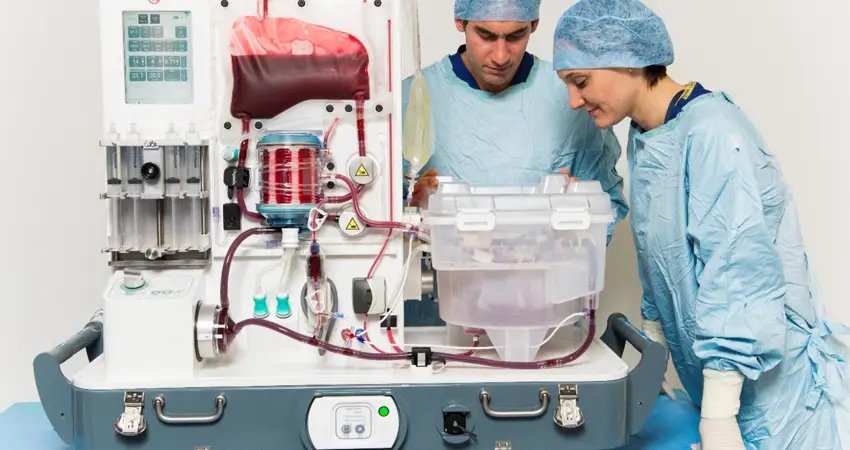26 Aug 2025
IBME spinout OrganOx sale to Terumo represents largest ever exit for the University of Oxford
OrganOx, a pioneering Oxford University spinout transforming kidney and liver transplantation, has been acquired by the Japanese global healthcare company, Terumo

Transplant surgeons and former University of Oxford DPhil students Annemarie Weissenbacher and David Nasralla interacting with the OrganOx metra® over the course of the first randomized trial of normothermic liver perfusion in transplantation, published as a cover story in Nature in May 2018
OrganOx, a pioneering Oxford University spinout transforming kidney and liver transplantation, has been acquired by Terumo Corporation, a global medical technology company headquartered in Tokyo, Japan, for $1.5 billion—marking the largest exit in Oxford University’s spinout portfolio to date and the first in excess of £1bn in its thousand-year history. The company was founded in December 2008 by engineering Professor Constantin Coussios OBE FREng FMedSci and transplant surgeon Professor Peter Friend FMedSci through Oxford’s Institute of Biomedical Engineering and the Nuffield Department of Surgical Sciences.
The acquisition marks the first exit under the pioneering partnership between the Department of Engineering Science and Technikos that led to the creation of the Institute of Biomedical Engineering (IBME). Technikos, a specialist medical technology venture capital fund based in London, partnered with the IBME in 2008 to commercialise its breakthrough research, and OrganOx was the first of over 30 companies created under this model to date. This milestone more than validates Technikos’ early commitment and underscores the long-term value of investing in Oxford’s biomedical innovation. The acquisition represents a 50-fold return for founding investors.
OrganOx specialises in cutting-edge organ preservation technology that allows donor organs to be kept functioning outside the body for significantly longer than traditional methods. Its devices use a technique known as Normothermic Machine Perfusion (NMP), which circulates warm, oxygenated blood-like fluid through the organ, closely replicating conditions inside the human body. This enables clinicians to assess organ function in real time and make better-informed decisions about transplantation. The technology has helped increase the number of viable organs available for transplant, including those from marginal donors, and has reduced the need for emergency and night-time procedures. OrganOx’s innovations have been widely adopted across healthcare systems, with involvement in over 6,000 transplants to date, and recognised at the highest level—most recently with the 2025 MacRobert Award, the UK’s most prestigious prize for engineering innovation.

Oxford University was an early investor in OrganOx, supporting the company with proof-of-concept funding via the University Challenge Seed Fund and investing further through the Spinout Equity Management Fund. OrganOx also received substantial support from the Royal Society as the first investment of its Enterprise Fund (subsequently acquired by Amadeus Capital Partners), whilst many of the clinical translation activities that happened collaboratively between OrganOx and the University were supported by the National Institute for Health Research (NIHR) through both its Oxford Biomedical Research Centre (BRC) and multiple Invention for Innovation (i4i) awards.
Professor Constantin Coussios, Director of Oxford University's Institute of Biomedical Engineering and co-founder of OrganOx, says, "This technology was born from a deep collaboration between engineering and clinical science within the Institute of Biomedical Engineering, uniquely enabled by Oxford’s unparalleled cross-disciplinary innovation ecosystem. From the outset our aimwas to solve one of transplantation’s greatest challenges: preserving organs in a viable state for longer, so at to make it possible to assess and potentially transplant what was previously thought untransplantable. Seeing that vision realised for the benefit of patients across 4 continents has been incredibly rewarding, and this acquisition will further enhance the global reach and impact of Oxford’s innovative science."
Professor Peter Friend, transplant surgeon, previous Director of the Oxford Transplant Centre and co-founder of OrganOx, says, "As a clinician, I’ve seen first-hand the limitations of traditional organ preservation. OrganOx technology is transforming the landscape of organ transplantation, with huge impact on both patients and surgeons. The success of this venture results from a highly effective synergy between two academic departments, Surgical Sciences and Engineering, and the support from the University of Oxford has been instrumental in translating our research into real-world impact."
OrganOx and Terumo Corporation have had a long history of partnership on the development of OrganOx’s metra® device and strengthened this partnership through a strategic investment made in February 2025 via its corporate venture capital arm, Terumo Ventures. The acquisition remains subject to regulatory approval and other steps required in accordance with applicable laws. The acquisition is expected to accelerate OrganOx’s clinical impact and global reach, bringing its technologies to patients and healthcare systems worldwide both across and beyond transplantation.
This transaction represents the University’s first ever exit in excess of £1bn and cements its position as one of the world’s leading ecosystems for cutting-edge innovation across deep tech, life sciences, and engineering.




